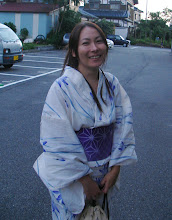Today was my daughter's second day at nursery school and allow me to say that I'm very proud of her because she didn't cry at all (and she's always been a crybaby and very attached to me)! My baby girl is growing up! :)
So what are Japanese preschools like? First, there are two main kinds of preschools: yochien (or kindergartens) and hoikuen (or nursery school/daycare - which my daughter belongs to). Yochiens are supervised by the Ministry of Education, Culture, Sports, Science and Technology whereas the hoikuens are supervised by the Ministry of Health, Labor and Welfare. That alone should already have given you a hint as to the differences between the two. Namely, the public yochiens are more regulated as to what goes into the curriculum, tuition and fees are the same across the board, the day ends earlier (2 PM), etc. Public hoikuens are geared towards caring for infants and toddlers, the curriculum is centered on "play", school hours vary and they take children early and have extended care into the evening plus a Saturday care should the parents need to work, and tuition and fees depend on each household's previous year's income.
I notice that the nursery schools here are also very strict on a few things. This may or may not be factual, but it is based on my observations of a few local nursery schools in my area.
1) Greetings - Schools here are big on making sure that children greet their teachers and others properly. Bow and say "good morning" (or good afternoon) in a loud, clear voice. Greetings before and after eating are enforced.
2) Hygiene - Schools here are obsessive about hygiene. There is a huge amount of hand washing and mouth rinsing going on at the school. Personally, I don't worry so much about it when my daughter is at home, but I suppose preschools are breeding grounds for germs with all the small children there touching who-knows-what and passing the germs around. I've read somewhere about how the Japanese are developing more and more allergies (and I do think it's true .. I've never met people with more allergies than the Japanese) because they are so darn CLEAN and their bodies never got to develop any resistance for allergens. I don't know if this is true, but it sure made sense to me!
3) Groupism - Children play in groups and chairs and desks are arranged in small groups within the classroom.
I am sure the list will grow as time passes and I get to see what goes on at my daughter's school more, but the above is what I have noticed so far. I do think the schools here are pretty good. The equipments are not as fancy and high-tech as the preschools in the US, but the teachers are well-trained and care deeply for the children and the schools here and up to standards and safe. My daughter seems to be enjoying school so far and that is what matters to me.
For anyone curious about a comparative study of 3 different preschools (US, Japan and China), this excellent book is highly recommended! This book is a follow-up book to the study done 20 years before of the same schools.
skip to main |
skip to sidebar

A blog about a stay-at-home mom to a bilingual preschooler's life in Japan. Read about Japanese culture and lifestyle, food and drinks, parenting, and bilingual education here!
Yummy Mummy's Tea House
Read my articles
About Me

- Yummy Mummy
- I am a proud mommy to a bilingual, preschool-aged daughter, live in Japan, and have broad and varied interests. Not having the time to do it all (and admittedly, I get bored a little too easily), my current passions include parenting, homeschooling, traveling and learning about other cultures and languages. Now that my daughter is starting preschool and since I don't have an outside job, I plan to devote my time and energy into writing and figuring out how to cruise the cyberspace (and hopefully, make some money from it). I plan to also pick up a new hobby or two -- probably something crafty, although I don't have a crafty bone in my body, so that should be a challenge. I am also a pessimist, but for some odd reason, I am feeling quite optimistic about things this year (hope I didn't just jinx that!). I suppose we'll just see how it all goes...
No comments:
Post a Comment